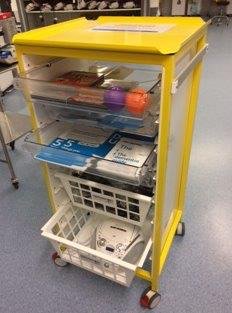Our main recovery room is a 19 bedded unit which serves 18 theatres, including paediatric theatres, so the challenges faced by staff to provide space, calm and routine for our patients with dementia are very real. It was felt that many national and local guideline documents did not provide recommendations for care for the theatre and recovery aspect of the patient's surgical journey through hospital.
A recovery staff nurse survey confirmed that, as nurses, we felt that we were not doing all we could to ensure the post-anaesthetic experience of this vulnerable group of patients dissipated their anxiety effectively, involved their carers or was as individualised as it could be. It was of therefore falling short of the high quality care we wanted to be providing.
As part of a Chief Nurse Junior Fellowship Excellence in Care scholarship I am undertaking, I introduced 3 streams of service improvement to better the care of patients with dementia in recovery.
Firstly, I put together a 'dementia care resource trolley' with the help and advice of Activity Specialists in the Health Care of Older People specialty, and nurses from the trauma orthopaedic wards who already had something similar in place. The resource trolley houses a CD player, disposable headphones and a selection of classic music CDs, Twiddlemuffs (a knitted muff with accessories sewn on which is used as a stimulation activity for the restless hands of patients with dementia) and stress toys. There is also a variety of literature and DVDs for staff for information and to help keep their knowledge up to date. The trolley has been utilised many times already in recovery and the staff are enthusiastic about its calming influence on distressed patients.
I am also working with the trauma and orthopaedic wards, from which we receive the vast majority of our patients with dementia, to ensure the 'About Me' document - a form filled out on admission by the patient and their relatives or carers which provides the healthcare team with lots of information about their life, likes and dislikes- is utilised as effectively as possible by all parties along the patient's journey.
Lastly, I am introducing flexible staff training on the topic of dementia in the form of e-learning podcasts which can be worked through at the individual's own pace, as and when they get some time to do so.
The aim is that these innovations within our unit will raise awareness among the recovery staff of caring for patients with dementia and assist the healthcare team in meeting the specific needs of patients with dementia, increasing their confidence as they do so.
The next step is to roll out this project to the many other recovery areas across the hospital trust. For further information please contact [email protected]

